
Fossil Record
Scope & Guideline
Uncovering the Past, Shaping the Future of Paleontology
Introduction
Aims and Scopes
- Paleontological Diversity:
The journal emphasizes the documentation and analysis of fossil diversity across different geological periods and taxa, providing insights into evolutionary patterns and biodiversity through time. - Morphological Studies:
Research focusing on the morphology of fossilized organisms, including anatomical descriptions, functional morphology, and the implications of morphological traits for understanding evolutionary relationships. - Paleoenvironmental Reconstructions:
Studies that reconstruct ancient environments based on fossil evidence, contributing to our understanding of past ecosystems and climatic conditions. - Taxonomic Revisions and New Species Descriptions:
The journal frequently publishes taxonomic revisions and descriptions of new species, which are crucial for advancing knowledge in systematic paleontology. - Technological Advances in Fossil Analysis:
The incorporation of new methodologies and technologies, such as micro-CT scanning and isotopic analysis, to enhance the understanding of fossils and their contexts. - Paleoecology and Evolutionary Dynamics:
Research addressing the ecological interactions among ancient organisms and their evolutionary dynamics, including the impact of environmental change on species survival and diversification.
Trending and Emerging
- Digital and Computational Paleontology:
There is a notable increase in studies utilizing digital technologies, such as 3D modeling and virtual reconstructions, which enhance the analysis and interpretation of fossil specimens. - Climate Change and Paleoclimatology:
Research linking fossil evidence to past climate changes has gained traction, reflecting a growing interest in understanding how ancient organisms responded to environmental shifts. - Ecosystem Dynamics and Interactions:
Emerging studies are focusing on the interactions within ancient ecosystems, including predator-prey dynamics and symbiotic relationships, which offer insights into ecological resilience and evolution. - Microfossil Studies:
An increase in research involving microfossils, such as foraminifera and palynology, suggests a trend towards understanding smaller-scale ecological changes and their implications for larger biotic patterns. - Fossilized Behavior and Ontogeny:
There is a rising interest in exploring behaviors of ancient organisms and their developmental patterns, contributing to a deeper understanding of life history strategies in the fossil record.
Declining or Waning
- Paleoanthropology:
Research specifically focused on human evolution and fossil hominins has become less common, possibly due to the shift toward more diverse topics within vertebrate paleontology. - Taphonomy:
Although still relevant, studies explicitly centered on taphonomic processes and fossil preservation may be appearing less frequently, as the journal's focus has broadened to include more diverse fossil groups. - Paleobiogeography:
While discussions of biogeographic patterns remain important, the frequency of dedicated studies in this area appears to be decreasing, potentially as the journal emphasizes broader ecological and evolutionary themes. - Invertebrate Paleontology:
Research focusing exclusively on invertebrate fossils may be declining, as the journal has increasingly featured studies on vertebrates and more complex organisms.
Similar Journals
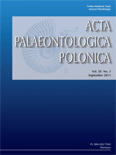
ACTA PALAEONTOLOGICA POLONICA
Illuminating the Path of Life Through TimeACTA PALAEONTOLOGICA POLONICA is a leading scholarly journal in the field of paleontology, published by the Institute of Paleobiology, Polish Academy of Sciences. With its open access model established since 1956, the journal ensures that vital research related to Earth's history and the evolution of life is freely accessible to a global audience. Based in Warsaw, Poland, this journal has garnered a respectable impact within the academic community, currently positioned in the Q2 quartile of its field and ranking #47 out of 113 in Scopus for Earth and Planetary Sciences, reflecting its significance in advancing paleontological research. Covering a wide range of topics related to fossil studies and evolutionary biology, ACTA PALAEONTOLOGICA POLONICA serves as a crucial platform for researchers, professionals, and students alike, encouraging the dissemination of innovative ideas and discussions that contribute to our understanding of past life on Earth. As it continues to publish high-quality articles through to 2024 and beyond, this journal remains integral to the ongoing discourse in paleontological sciences.
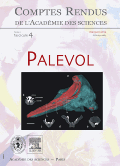
COMPTES RENDUS PALEVOL
Elevating Paleontology Through Quality Research and ReviewCOMPTES RENDUS PALEVOL, published by ACAD SCIENCES in France, stands as a pivotal journal in the field of paleontology. With an ISSN of 1631-0683 and an E-ISSN of 1777-571X, this esteemed publication provides a platform for innovative research and scholarly discourse, contributing significantly to the understanding of Earth's biological history. Having achieved a commendable Q2 rank in the 2023 Paleontology category and positioned at Rank #63 out of 113 in the Scopus Earth and Planetary Sciences segment, it underscores its relevance and influence in the scientific community. The journal's converged years from 2002 to 2024 reflect a commitment to ongoing research and knowledge dissemination. Although currently lacking open access options, the journal's rigorous peer-review process ensures the integrity and quality of published articles, making it an essential resource for researchers, professionals, and students striving to explore and expand their expertise in paleontological sciences.

RIVISTA ITALIANA DI PALEONTOLOGIA E STRATIGRAFIA
Illuminating the Path of Geological DiscoveryRIVISTA ITALIANA DI PALEONTOLOGIA E STRATIGRAFIA, published by Università degli Studi di Milano, is a leading open access journal dedicated to the fields of Paleontology, Geology, and Stratigraphy. Established in 1979, this prestigious journal fosters the dissemination of high-quality research and innovative studies within these disciplines, holding a commendable Q2 ranking in Geology, Paleontology, and Stratigraphy as of 2023. The journal’s commitment to accessibility since 2016 underlines its objective to promote the sharing of knowledge among researchers, professionals, and students alike. With its notable Scopus rankings reflecting a solid performance in the Earth and Planetary Sciences, particularly in Paleontology and Stratigraphy, RIVISTA ITALIANA serves as a vital resource for those seeking to stay informed on the latest advancements and discoveries within the geological sciences. For further inquiries, the editorial office is located at C/O RIVISTA ITALIANA PALEONTOLOGIA STRATIGRAFIA, VIA MANGIAGALLI, 34, 20133 MILANO, ITALY.

Stratigraphy
Uncovering the Past, One Stratum at a TimeStratigraphy is a distinguished journal dedicated to advancing the field of paleontology and stratigraphic research. Published by MICRO PRESS in the United States, this journal is accessible via its ISSN 1547-139X and E-ISSN 2331-656X, providing an essential platform for researchers, professionals, and students alike. With a robust focus on the intricate relationships between geological time and the fossil record, Stratigraphy aims to disseminate high-quality research that enhances our understanding of Earth’s history. Its ranking within the 2023 Q2 category of paleontology reflects its commitment to scholarly excellence, as noted by a Scopus ranking of #65 out of 113 in the Earth and Planetary Sciences domain, placing it in the 42nd percentile. Although not open access, the journal's valuable contributions from 1988 to 2024 encourage a collaborative dialogue among the scientific community, underscoring the significance of stratigraphic studies in environmental and evolutionary research.
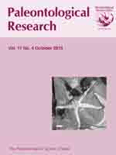
PALEONTOLOGICAL RESEARCH
Charting the Course of Earth's Biological Legacy.PALEONTOLOGICAL RESEARCH, published by the PALAEONTOLOGICAL SOCIETY OF JAPAN, is a prominent peer-reviewed journal that addresses key developments in the field of paleontology, ecology, and evolutionary biology. With an ISSN of 1342-8144, this journal has established itself as a vital resource for researchers and professionals who seek to explore the intricate history of life on Earth, integrating insights into evolutionary dynamics and ecological frameworks. Operating since 1997 and with content converging up to 2023, PALEONTOLOGICAL RESEARCH occupies a notable position, ranked in the second quartile within both Ecology, Evolution, Behavior and Systematics and Paleontology categories. While it is not an open-access journal, its rich repository of studies significantly contributes to the academic community. Researchers and students engaged in the exploration of ancient ecosystems and their implications for current biodiversity are sure to find valuable insights within its pages, reinforcing the journal's importance as a leading platform for disseminating paleontological knowledge in Japan and beyond.
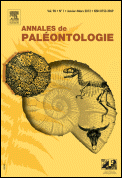
ANNALES DE PALEONTOLOGIE
Unearthing the Past, Shaping the FutureANNALES DE PALEONTOLOGIE is a distinguished academic journal published by MASSON EDITEUR that plays a pivotal role in the field of paleontology. With an ISSN of 0753-3969 and an E-ISSN of 1778-3666, this journal has been a vital resource since its inception in 1988, continuously contributing to the advancement of knowledge in Earth and Planetary Sciences, particularly focusing on paleontological research. Currently ranked #68 out of 113 in its category by Scopus, and celebrated for its Q2 quartile standing, ANNALES DE PALEONTOLOGIE publishes innovative studies, reviews, and discussions that appeal to a diverse audience of researchers, professionals, and students. The journal aims to foster a deeper understanding of paleontological phenomena and encourages interdisciplinary collaboration within the scientific community. Although it is not an open access journal, its commitment to scholarly excellence ensures that the content is highly regarded and widely referenced in academic circles. Situated in Issy-les-Moulineaux, France, it continues to maintain a global readership while promoting significant advancements in paleontological research.
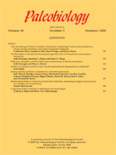
PALEOBIOLOGY
Connecting the Dots of Evolution Through TimePALEOBIOLOGY, published by Cambridge University Press, is a premier, peer-reviewed journal that stands at the forefront of research in paleontological sciences. With a robust commitment to advancing the study of the interactions between ancient life forms and their environments, the journal has established itself as a vital resource for researchers, professionals, and students in the fields of paleontology, ecology, and evolutionary biology. Spanning from 1975 to 2024, it boasts an impressive Q1 ranking in several categories, including Agricultural and Biological Sciences, Ecology, and Paleontology, indicative of its high impact and relevance in shaping contemporary scientific discourse. While the journal is not open access, it offers a variety of subscription and access options, ensuring broad distribution and visibility of published research. As a leader in its discipline, PALEOBIOLOGY aims to facilitate a deeper understanding of our planet's biological history, making it an essential publication for anyone interested in the dynamics of life across geological time.
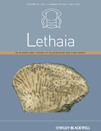
LETHAIA
Unveiling the Mysteries of Life Through TimeLETHAIA, an esteemed journal published by Scandinavian University Press - Universitetsforlaget AS, serves as a vital platform for the dissemination of innovative research in the fields of paleontology as well as ecology, evolution, behavior, and systematics. Established in 1968 and continuing its impactful journey until 2024, LETHAIA has consistently contributed to advancing scientific understanding of Earth's biological and geological history. With a 2023 impact factor placing it in the Q2 category for both Paleontology and Ecology, Evolution, Behavior and Systematics, the journal is recognized for its high-quality, peer-reviewed articles that engage and challenge the academic community. Researchers, professionals, and students alike will find LETHAIA to be an indispensable resource for the latest findings, methodologies, and theoretical advancements in these interlinked disciplines.
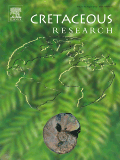
CRETACEOUS RESEARCH
Unearthing the Secrets of the Cretaceous EraCRETACEOUS RESEARCH, published by Academic Press Ltd - Elsevier Science Ltd, is a leading journal in the field of Paleontology that has established itself as an essential resource for researchers and professionals delving into the rich tapestry of the Cretaceous period. With its ISSN 0195-6671 and E-ISSN 1095-998X, this journal boasts a prestigious placement in the academic landscape, holding a Q1 rank in the 2023 Paleontology category and proudly positioned at 21st out of 113 in the Scopus ranking, reflecting its impact factor that places it in the 81st percentile. Since its inception in 1980, CRETACEOUS RESEARCH has facilitated a deeper understanding of prehistoric life and its evolutionary processes, covering topics such as fossil discoveries, paleoecology, and biostratigraphy. This journal best serves those seeking to expand their knowledge and contribute innovative findings to the scientific discourse surrounding the Cretaceous era. As it continues to converge into the future until 2025, it remains dedicated to providing an open platform for the dissemination of high-quality research that shapes our understanding of Earth’s geological past.
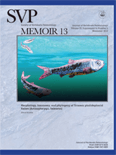
JOURNAL OF VERTEBRATE PALEONTOLOGY
Fostering Collaboration in the Study of Vertebrate HistoryJOURNAL OF VERTEBRATE PALEONTOLOGY, published by Taylor & Francis Inc, is a premier academic journal dedicated to advancing the field of vertebrate paleontology. With a strong emphasis on both traditional and innovative research methods, this journal provides a platform for the dissemination of influential studies and discoveries that shape our understanding of vertebrate evolution and their ecological contexts. Operating under an ISSN of 0272-4634 and an E-ISSN of 1937-2809, it covers research published since 1981 and aims to foster a collaborative environment for researchers, professionals, and students alike. The journal is currently ranked in the Q2 category of Paleontology, standing at position #45 among 113 in its Scopus category, which underscores its significant contribution to the academic community. As a crucial resource for scholars, JOURNAL OF VERTEBRATE PALEONTOLOGY provides insights that not only enrich academic discourse but also stimulate further research and exploration in a field that bridges biology, geology, and conservation.